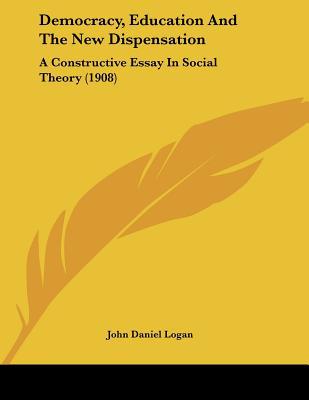

 |

|

The average rating for Democracy, Education And The New Dispensation: A Constructive Essay In Social Theory (1908) based on 2 reviews is 4 stars.
Review # 1 was written on 2018-12-10 00:00:00 Chi-chung Chang Chi-chung ChangEpistemological inquiry in the form of self-denigrating autobiography. Written in the third person, at times overbearingly acerbic. Author Henry Adams was grandson of President John Quincy Adams and great-grandson of President John Adams. He was a Boston Puritan born in 1838 who at sixteen attended Harvard College—severely berated here—and went on to pursue a career as a journalist, novelist and historian. His historical gamut stretches from the American Revolution to the years just before World War I. His writing is wry with patches of brilliance and, less often, turgidity. There are some extraordinary scenes. In one it's 1860 and Henry Adams travels as a courier for the American consulate to Sicily to find Garibaldi "in the Senate house toward sunset, at supper with his picturesque and piratic staff, in the full noise and color of the Palermo revolution." He also meets William Makepeace Thackery, Robert Browning, Algernon Swinburne, Charles Lyell, Ulysses S. Grant, Rudyard Kipling and Robert Louis Stevenson, to name a few. It was fascinating for me to learn that in 1861, when the author arrived in England as a private secretary to his U.S. diplomat father, that the British recognized the legitimacy of the Confederate belligerency and came close two years later to recognizing the Confederacy as a state. Then came the Trent Affair in which two Confederate diplomats (Mason and Slidel) were seized by a U.S. vessel from a British mail steamer—clearly an act of war. The author describes the tentativeness of their position in London at the time. Mostly the first half of the book is a merciless dissection of British royalty, society, manners, dining (ugh), and eccentricity in general in the latter half if the 19th century. Adams views it as wholly self-centered and self-regarding, a closed world without lessons to offer him. He's says so in a singular, scabrous overview that's at times very funny. It occurs to me that the The Education of Henry Adams (1906)—whether intentionally or not—serves as a kind of corrective to James Boswell's The Life of Samuel Johnson (1819). In it many of the assumptions underlying that earlier work are called into question. Dr. Johnson's famous bromide—"When a man is tired of London, he is tired of life."—gets a thorough refutation. Adams' insights come at the expense of himself and anyone nearby. His irony morphs at times into vitriol. Lauded as a unique view on the American story. I think it very well may be. This has for me been one of those great interstitial reads, in which, using the framework of autobiography, the writer is able to cover many of the nooks and crannies of history often overlooked in more general texts. Neil Sheehan does much the same thing but with biography in his Bright Shining Lie: John Paul Vann and America in Vietnam. I recommend both books highly, though from a literary point of view Sheehan's is the better written work. Time has not been kind to Adams' style. Though there must have been a day when it was considered muscular, its phrasing today strikes one as slightly archaic and stilted at times. Its historical insights may be unique, but the text's omissions are as telling as its inclusions. Indeed, Henry Adams' world seems strangely Islamic with half its population going unmentioned. Women had virtually no role in the society of his day—they certainly did not have the vote—except as helpmeets and incubators of heirs. It's very strange to read historiography which excludes them so painstakingly. (Tellingly, Clover, his wife of many years, is completely written out of the book. This seems truly strange when one learns by way of a Wikipedia search that in 1885 she killed herself by drinking darkroom chemicals. Adams takes a page or two to rhapsodize about the Augustus St Gaudens' statue he commissioned for her grave, in Rock Creek Cemetery, but he never tells us it's for his wife. This we must learn by independent means.) It is the ultimate form of self-denigration to declare that one is beyond education. The kind of almost omniscient learnedness that Adams pursues is a literary convention that dates to the ancients. He returns to this hobbyhorse over and over. It wears thin, for he is only able to keep to his steed by views increasingly abstract. The writing—always a challenge—grow less coherent the deeper into the book we go. So an at times fascinating if ultimately problematic read. |
Review # 2 was written on 2018-03-19 00:00:00 William Bair William BairAmazing. There are a just a few books (Meditations, Decline and Fall of the Roman Empire, Brothers Karamazov) that I feel every person on the planet should read. This is one of those books. If you are a historian, a diplomat, a Civil War buff or an amateur philosopher, this book will strongly resonate. |
CAN'T FIND WHAT YOU'RE LOOKING FOR? CLICK HERE!!!